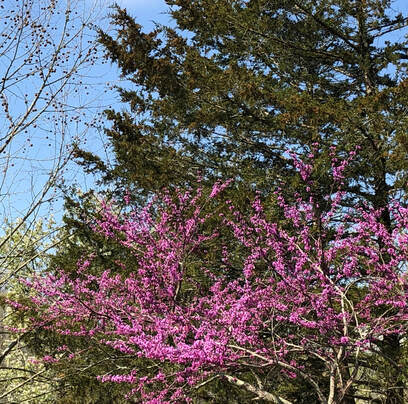As We Pause
 A brilliant redbud, before May’s freezing temps. What a strange spring. What a strange year.
A brilliant redbud, before May’s freezing temps. What a strange spring. What a strange year.During the winter months, I’m not sure we had five nights when the temperature dipped below freezing. Here, in the middle of May, we’re trying to make up for it.
I noticed this morning that the leaves in the tops of my redbud trees and tulip poplars are black and crumpled. I’m reading that this will not damage the trees, but after one of the most beautiful redbud blooming seasons that I can remember, it’s hard to see the trees’ new leaves suffer in the cold.
It’s May 10, and we have yet to see any goslings or ducklings on the lake. This seems unusually late, but I remain hopeful as I continue to see Mallard and Canada Geese pairs waddling around the neighborhood. And there is a large bird, perhaps a Blue Jay, sitting in a nest just beyond my office window, so some natural spring activity is taking place.
Recently I’ve noticed a lot of birds I don’t usually see: a Red-headed Woodpecker, an Eastern Kingbird, a Scarlet Tanager pair, a Yellow-rumped or Myrtle Warbler with its three astonishing yellow patches. We also seem to have plentiful Tree Swallows, Barn Swallows, Red-winged Blackbirds, Bluebirds, and Killdeer, despite the acres and acres of woodlands that have been turned into muddy deserts here in our neighborhood. Do I have more time to look for them this year, or are they moving into territories where they haven’t always been as plentiful?
The whole world seems upside down to us right now, of course. Nothing seems normal. I guess it’s no surprise that even Mother Nature seems a little off. Perhaps as I acknowledge the usual harbingers of spring, the sheer ordinariness of those events will nudge us toward a more unremarkable time.
Occasionally I have wondered aloud whether the novel coronavirus isn’t Mother Nature’s way of resetting the balance. Few can seriously argue that we haven’t wreaked havoc on this world that nurtures us. Our sheer numbers strain the earth’s resources. And the planet doesn’t need humans to sustain its ecosystems. Without our presence, other predators would pick up our load, or illnesses like chronic wasting disease would run through animal populations, thinning the herd. Much like COVID-19 appears set on thinning ours.
As this pandemic has forced us to put many human activities on pause, nature has been busy reversing the deleterious effects of our obsession with productivity. Around the world, water is cleaner, air is purer, animals such as sea turtles have nested without human interference. In just a few short months, nature has begun to reclaim its domain.
Sitting comfortably in my home, I can’t ignore that this is occurring amid massive human suffering from an unstoppable virus that has stolen hundreds of thousands of lives and destroyed economies. The long-range effects of this pandemic, both human and otherwise, cannot yet be imagined. If the human race is to survive, we must, and we will, apply our scientific knowledge toward finding a way to exist with this virus in our midst.
But while we’re focused on that critical task, can we not also recognize the value of adjusting our impact on this earth so we eventually live as grateful recipients of its abundance, rather than as relentless destroyers of the gifts it has to offer?
Published on May 10, 2020 13:43
No comments have been added yet.



